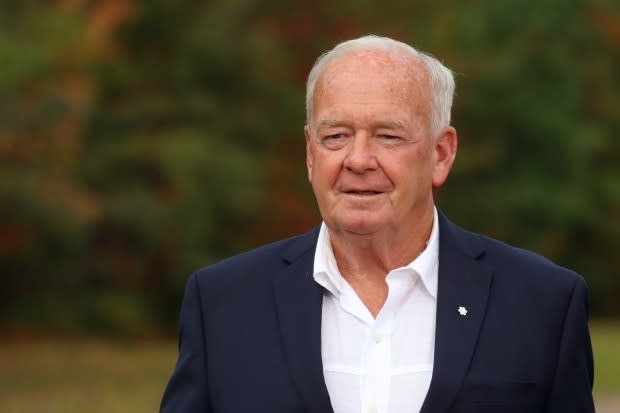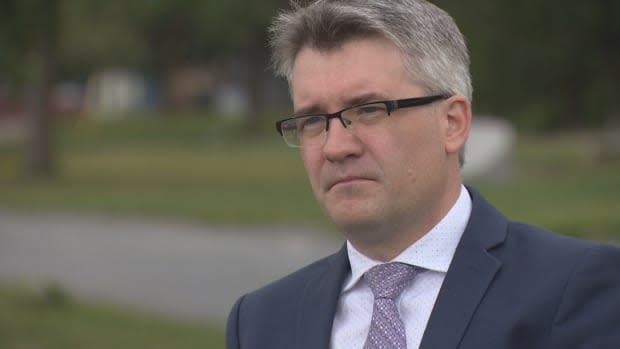For Blaine Higgs, whether to grant status to small parties may be a political calculation
For New Brunswick Premier Blaine Higgs and his Progressive Conservative government, last month's majority election victory means more than just full control of the legislative agenda.
It also gives them an opportunity to hamstring the two smaller parties in the legislature, the Greens and the People's Alliance.
With a majority, the PCs now control the committees that decide whether those parties get a major role in legislative business and how much funding they receive to hire support staff.
"The premier's choice appears like a pretty straightforward political calculation," said Erin Crandall, a political scientist at Acadia University in Wolfville, N.S.
"During the minority government, he needed the support of these third parties to govern, hence was incentivized to grant official party status.
"With a majority government, he no longer requires the support of these third parties and has a very different incentive, to make it more difficult for them to grow and build support moving towards the next election."
Political calculations
Of course, Higgs prides himself on his reputation for not making straightforward political calculations.
Just two years ago, he spoke repeatedly about how marginalizing the Greens and the Alliance would be a slap in the face to voters who opted against the two traditional mainstream parties.
"They've elected two other parties that cannot and should not be shut out of this process," he said when there was a proposal for a PC-Liberal coalition that would have shut out the two upstarts.

Now the premier is non-committal.
"We will hold discussions with the other parties over the next week or two in relation to the Green and PANB parties' status," Higgs said in a written statement.
The legislature is scheduled to start a new session with a speech from the throne on Nov. 17.
Assembly's rules and exceptions
Technically, the Greens and the Alliance had no right to any formal status in the legislature back in 2018.
The assembly's rules say a party must win five seats, or 20 per cent of the vote in an election, to be "recognized" as an official party.
That status gives the party's MLAs the right to make statements every day and to respond to statements from ministers.
But several times in the last three decades, different governments and legislatures have made exceptions to that rule.
It happened for NDP leader Elizabeth Weir after she was first elected in 1991. It was repeated for Green Leader David Coon in 2014 and most recently for the two small parties in 2018.

By law, the leader of a registered party elected to the legislature, such as Weir and Coon, gets a small office budget, even if they're a caucus of one. Changing that rule would require legislation.
But how frequently they get to speak hinges on a simple motion of the legislature to suspend the five-MLA rule.
"The precedent's been in place now for a while and I don't see why he'd make any change to that," Coon said of Higgs's looming decision.
Former Progressive Conservative leader Dennis Cochrane, who won three seats in 1991 but gained official party status by winning more than 20 per cent of the popular vote, predicts Higgs will extend the exception for the two small parties.
But rather than continue making exceptions, he said the government should simply change the standing rule to lower the five-MLA threshold.
"You can't keep making exceptions," Cochrane said.
Looking forward
Beyond the automatic budget for a registered party leader, the all-party legislative administration committee determines exactly how the funding for all 49 MLAs is carved up, depending on their numbers and their status.
In 2019, the committee agreed to a per-MLA formula for funding levels. Officials at the legislature refused to release it publicly on Thursday.
Coon said he expects Higgs will support the status quo on funding and on party status, and isn't concerned about the premier's hesitation to commit to it so far.
"I'm sure if he was thinking of doing something different, he'd have told me," Coon said.
The day he was sworn in as premier, Higgs promised all MLAs they'd have a bigger role in decision-making.
"You will have an unprecedented say in shaping the future of this province," he told them. "You will have real power that will be shared and will not simply be held by members of cabinet."

Alliance Leader Kris Austin said it would be hypocritical for Higgs to now act differently.
"If he doesn't follow through on what he did in the minority government and removes that party status now, it's going to speak a lot to his character," he said.
Without those resources, Austin said, "We lose funding, we lose the ability to research, we lose the ability to point out issues that government refuses to acknowledge or the Official Opposition has overlooked or doesn't want to acknowledge themselves."
Coon agrees: "We want to fully participate in the work of the legislature and that means ensuring that our MLAs have the opportunities to speak on issues that are important to their constituents or fall within their responsibilities as critics."
Little say anyway
The Official Opposition Liberals haven't decided yet whether to support or oppose continued recognition of the two smaller parties. In 2014, newly-elected Premier Brian Gallant ensured Coon was given that status.
"So far we haven't considered the issue," said interim Liberal Leader Roger Melanson.
But unlike 2018, when MLAs from the three opposition parties outnumbered the government, the Liberals — like the Alliance and the Greens — have little say in the matter.

With a majority in the legislature, the PCs also have a majority on the committees that will make the decisions.
"Even though the premier is not on those committees necessarily, he will be making the decisions about what those Progressive Conservative members on those committees are going to do," Crandall said.
"The work of those committees that have a majority of government members on them can more or less be a foregone conclusion."


